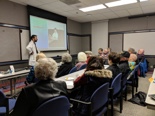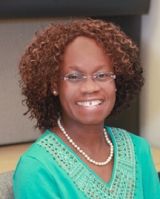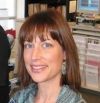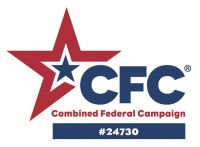Mended Hearts of Southern Oregon is very grateful for the great speakers we have each monthly meeting. Here are a few recent speakers:
 Dr. Miruais S. Hamed, FACC, MD, a Cardiologist with Southern Oregon Cardiology, gave a fascinating presentation titled "Show Me Your Heart" to a standing-room-only audience at our February 2019 meeting.
Dr. Miruais S. Hamed, FACC, MD, a Cardiologist with Southern Oregon Cardiology, gave a fascinating presentation titled "Show Me Your Heart" to a standing-room-only audience at our February 2019 meeting.
Dr. Hamed covered a variety of methods for looking at the heart, including X-Ray, Ultrasound, CT, MRI and PET / Radioisotope scanning. Videos of 3D and motion scans made the presentation even more interesting.
Some highlights:
Note: for those interested in further study of anatomy, Dr. Hamed recommended the "Sobotta Atlas of Human Anatomy".
 Our November meeting was outstanding. Dr Ariane Neyou, a Cardiologist with Southern Oregon Cardiology in Grants Pass, answered all our questions about Atrial Fibrillation or AFib. The general population has about a 1% chance of experiencing AFib. Depending on the type of heart surgery a patient has, the patient will have a 40-60% chance of experiencing AFib. Obviously, it is important for heart surgery patients to recognize the symptoms and to take action when necessary. AFib weakens the heart over time.
Our November meeting was outstanding. Dr Ariane Neyou, a Cardiologist with Southern Oregon Cardiology in Grants Pass, answered all our questions about Atrial Fibrillation or AFib. The general population has about a 1% chance of experiencing AFib. Depending on the type of heart surgery a patient has, the patient will have a 40-60% chance of experiencing AFib. Obviously, it is important for heart surgery patients to recognize the symptoms and to take action when necessary. AFib weakens the heart over time.
One may experience occasional, persistent or permanent AFib. AFib patents may have an increase stroke risk. One's stroke risk can be assessed using the Chad-Vas calculator found online. On the basis of sex, age, hypertension, vascular disease, congestive heart failure, previous stroke, TIA or thromboembolism and diabetes, the calculator gives a score that helps the physician know if aspirin is enough or if the patient needs warfarin or the addition of other anti-coagulants. A score of 0 is a low risk. 1 is moderate risk and over 1 is high risk if the patient is experiencing AFib.
Dr. Neyou showed us diagrams of the heart and how atrial fibrillation causes erratic electrical paterns. She showed us where the atrial is and talked about non-invasive as well as invasive treatments and when they are contra-indicated. The Lariat procedure, you may have read about in the Mail Tribune, is only ofr a very limited number of patients.
It's good to know what to do. Dr. Neyou then took questions from the members. There were many questions and members reported that all of their questions about AFib going in to the meeting were answered. Thanks, Dr. Neyou for taking the time to educate us on this important topic.
 Thank you, Andrea, for taking time to fill us in on the new Cardiac and Pulmonary
Rehab Center at RRMC. Many of us had questions on the funding, where
Cardiac Rehab education would take place in the new facility, when it would
open, how parking would be accommodated and more.
Thank you, Andrea, for taking time to fill us in on the new Cardiac and Pulmonary
Rehab Center at RRMC. Many of us had questions on the funding, where
Cardiac Rehab education would take place in the new facility, when it would
open, how parking would be accommodated and more.
Andrea gave us the full rundown. We found out that Cardiac Rehab education will take place in two existing conference rooms just a short distance from the new center. The conference rooms are near the chapel on the main floor.
Remember the old Emilia's Cafe at the South Entrance to RRMC? That's the new rehabilitation facility. It will be more than twice the size of the old facilities. The new facility is scheduled to be open next summer.
Another great feature being developed is a virtual Cardiac Rehab for those who live on the coast, up north and in California. It's shown to be almost as effective as being at Cardiac Rehab and will allow our patients from those areas to get most of the benefits of the Cardiac Rehab program. We will hear more about it in the future.
Would you like to see how the facility? You can sign up for a tour. They will be run starting on March 5th at 4:00 pm and will be conducted every other Thursday afternoon after that. Call the Asante Foundation if you are interested.
Community support for the new facility is vital. Hospital systems aren't required to provide Cardiac Rehab. RRMC and TRMC both have programs. To support the new facility and RRMC that has meant so much to Mended Hearts of Southern Oregon, we are taking up a collection to present to the Asante Foundation on behalf of Mended Hearts of Southern Oregon. Letters will go out to our members telling about our collection.
 Thanks, Amy, for taking time out of your busy schedule to talk about the value of
Cardiac Rehab.
Thanks, Amy, for taking time out of your busy schedule to talk about the value of
Cardiac Rehab.
Amy's talk is titled, "Thriving, Not Just Surviving". That's what Cardiac Rehab is all about. Such as the 51 year old who Cardiac Rehab got back to active bicycling and the patient who did the Pear Blossom 10K.
All heart patients experience a degree of emotion related to their condition. That emotion could be denial, anger, depression, self-pity, frustration, fear or the feeling that they are 'broken'. The 12 week Cardiac Rehab program is designed to overcome those emotions and get the patient back on track to a great quality of life.
The patient's care is individualized...it's not one size fits all. Having said that, the care is in a group setting so that patients can support and encourage each other. Cardiac Rehab staff lends a listening ear, gives encouragement and family support. They are the eyes and ears for your doctor since they see you several times a week for the 12 week program.
As you exercise, your heart rate and rhythm are monitored along with your blood pressure. You see those results which gives you great encouragement that your heart is functioning well.
The staff also provides education that many patients initially aren't excited about, but later rate as one of the best parts of the 12 week program.
As a Rehab patient, you are joining a class and are involved in group exercises, TM, bikes and NuStep, strength training, interval training all with individual coaching.
The Mayo Clinic recently released a study showing that graduates of a 12 week Cardiac Rehab program have a 45% lower risk of dying from any cause (not just heart related). That alone should make it worth the effort.
Thanks, again, Amy. As Accredited Visitors, we now have more ammunition to encourage the patients we visit to get into a Cardiac Rehab program.
 Dr.
Nathan Funk of Southern Oregon Cardiology gave a great talk on Chronic Heart
Failure at our April Meeting. We want to thank him for his great
presentation.
Dr.
Nathan Funk of Southern Oregon Cardiology gave a great talk on Chronic Heart
Failure at our April Meeting. We want to thank him for his great
presentation.
There are about 5.1 million cases of heart failure in the US resulting in 279,000 deaths each year. That alone says that it is an important disease to be aware of .
Heart failure is the inability of the heart to pump sufficient blood to eet the body's needs. It is most common in the left ventricle and can progress to the whole heart. Common symptoms are shortness of breath and edema.
Dr. Funk described what happens during the diastolic phase (filling phase) when the heart muscle is thick and stiff causing it to be ineffective. The other failure can be during the systolic phase (contracting phase) when the heart does not squeeze effectively. This all leads to elevated pressure in the heart.
Coronary artery disease is a big contributor.
How is heart failure diagnosed? Dr. Funk showed a picture of an elevated neck vein that is indicative. He also said he looks at history, a physical bnp level, ekg and stress test.
How is heart failure treated? There are beta blockers, ACE inhibitors, Aldosterone blockers and, for coronary artery disease, aspirin and statins.
Its best, whether you have heart failure or not, to consume less salt, eat a lot of fruit and green, leafy vegetables, fish and whole grains. Stay away from red meat.
If one must be hospitalized for heart failure the prognosis is poor. Heart failure should be managed before the patient gets to that stage. (That's why this educational event is so important.)
If you want more information to to www.mendedhearts.org/education/heartfailure. Click the "Go-to-guide" at the top to watch all the videos.
Mended Hearts of So. Oregon
© 2012 All Rights Reserved

